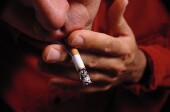- Double Mastectomy May Offer No Survival Benefit to Women With Breast Cancer
- Toxic Lead Found in Cinnamon Product, FDA Says
- Certain Abbott Blood Sugar Monitors May Give Incorrect Readings
- Athletes Can Expect High Ozone, Pollen Counts for Paris Olympics
- Fake Oxycontin Pills Widespread and Potentially Deadly: Report
- Shingles Vaccine Could Lower Dementia Risk
- Your Odds for Accidental Gun Death Rise Greatly in Certain States
- Kids From Poorer Families Less Likely to Survive Cancer
- Tough Workouts Won’t Trigger Cardiac Arrest in Folks With Long QT Syndrome
- At-Home Colon Cancer Test Can Save Lives
Timing of Day’s First Cigarette May Influence Lung Cancer Risk


The earlier smokers light that first cigarette of the day, the more likely they are to develop lung cancer, a new study finds.
A research team, led by Dr. Fangyi Gu of the U.S. National Cancer Institute, interviewed more than 3,200 current and former smokers in the United States and Italy. All of the smokers were asked about their smoking history and when they typically had their first cigarette of the day.
According to the researchers, people who started smoking within an hour of waking up had a significantly higher risk of developing lung cancer than those who lit up more than an hour after waking up.
The study accounted for variables such as smoking intensity, how long people had been smokers, and other lung cancer risk factors.
The link between lung cancer and the first cigarette of the day was stronger in current smokers than in former smokers, and in lighter smokers than in heavier smokers. There were no differences between men and women.
The study was published June 19 in the Journal of the National Cancer Institute.
Further research is needed, and the study can only point to an association between the timing of a smoker’s first cigarette and lung cancer risk; it cannot prove cause-and-effect.
However, assessing when smokers have their first cigarette of the day “may improve lung cancer risk prediction and could be useful in lung cancer screening and smoking cessation programs,” the study authors wrote.
More information
The U.S. Centers for Disease Control and Prevention outlines lung cancer risk factors.
Source: HealthDay
Copyright © 2024 HealthDay. All rights reserved.










